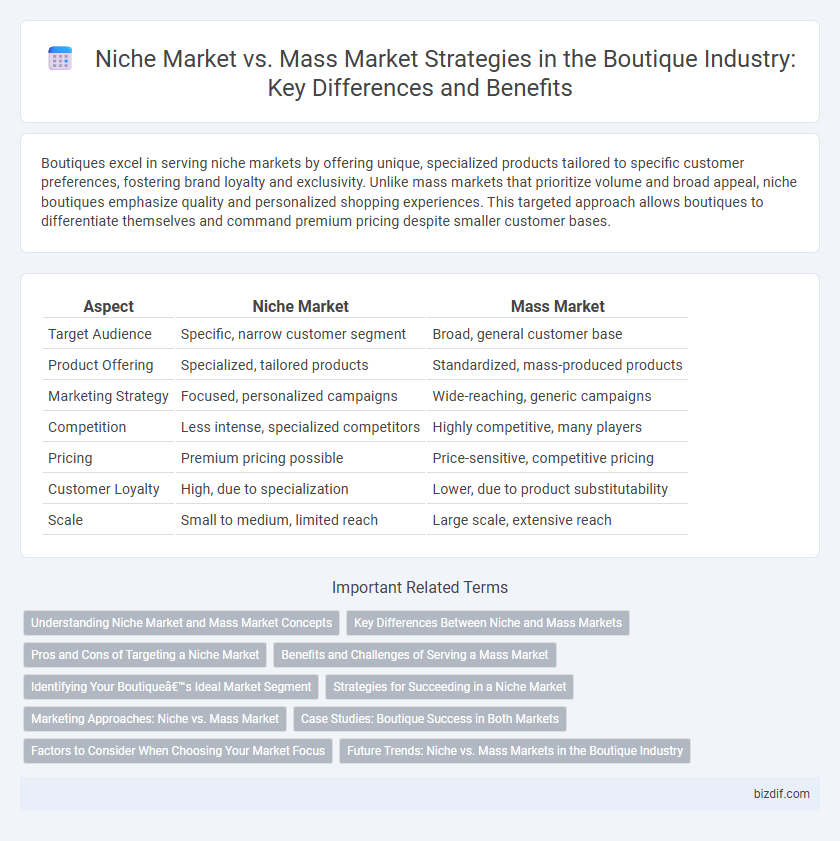Boutiques excel in serving niche markets by offering unique, specialized products tailored to specific customer preferences, fostering brand loyalty and exclusivity. Unlike mass markets that prioritize volume and broad appeal, niche boutiques emphasize quality and personalized shopping experiences. This targeted approach allows boutiques to differentiate themselves and command premium pricing despite smaller customer bases.
Table of Comparison
| Aspect | Niche Market | Mass Market |
|---|---|---|
| Target Audience | Specific, narrow customer segment | Broad, general customer base |
| Product Offering | Specialized, tailored products | Standardized, mass-produced products |
| Marketing Strategy | Focused, personalized campaigns | Wide-reaching, generic campaigns |
| Competition | Less intense, specialized competitors | Highly competitive, many players |
| Pricing | Premium pricing possible | Price-sensitive, competitive pricing |
| Customer Loyalty | High, due to specialization | Lower, due to product substitutability |
| Scale | Small to medium, limited reach | Large scale, extensive reach |
Understanding Niche Market and Mass Market Concepts
Niche markets target specific customer segments with tailored products or services, emphasizing specialized needs and preferences that mass markets often overlook. Mass markets focus on broad audiences with standardized offerings designed for widespread appeal and high volume sales. Understanding these concepts enables boutiques to strategically position themselves by catering to unique demands or scaling for larger consumer bases.
Key Differences Between Niche and Mass Markets
Niche markets target a specific, well-defined segment of consumers with unique preferences, offering specialized products or services that cater to their distinct needs. Mass markets address a broad audience by providing standardized products designed for wide appeal and high volume sales. Key differences include the level of customization, marketing strategies, and customer engagement, with niche markets emphasizing personalized experiences while mass markets focus on scalability and cost efficiency.
Pros and Cons of Targeting a Niche Market
Targeting a niche market allows boutiques to cater to specific customer needs, fostering strong brand loyalty and reducing competition by focusing on well-defined segments. However, the limited customer base may restrict revenue potential and increase vulnerability to market fluctuations compared to mass market approaches. Specialized products and personalized services enhance customer experience but require careful market research and higher marketing costs to effectively reach the niche audience.
Benefits and Challenges of Serving a Mass Market
Serving a mass market offers businesses significant benefits, including economies of scale, broader brand recognition, and increased revenue potential due to the large customer base. However, challenges arise from intense competition, the need for extensive marketing efforts, and difficulties in maintaining personalized customer experiences. Companies targeting mass markets must balance standardization with innovation to meet diverse consumer demands efficiently.
Identifying Your Boutique’s Ideal Market Segment
Identifying your boutique's ideal market segment involves analyzing demographic, psychographic, and behavioral factors to target customers with specific preferences and needs. Focusing on a niche market allows for tailored marketing strategies, higher customer loyalty, and reduced competition compared to the broad approach of mass market targeting. Leveraging data on customer buying habits and lifestyle trends sharpens your boutique's appeal, driving more effective product selection and personalized shopping experiences.
Strategies for Succeeding in a Niche Market
Succeeding in a niche market requires tailored strategies that emphasize deep customer understanding and specialized product offerings, which drive higher customer loyalty compared to mass market approaches. Boutique businesses achieve competitive advantage by focusing on unique value propositions, personalized experiences, and targeted marketing efforts that resonate with a specific audience segment. Leveraging data analytics to refine niche targeting and fostering strong community engagement further enhance brand differentiation and sustainable growth in specialized markets.
Marketing Approaches: Niche vs. Mass Market
Niche market marketing approaches concentrate on personalized messaging, targeting specific customer segments with tailored products and services to build strong brand loyalty. Mass market strategies emphasize broad reach through high-volume advertising, standardized products, and competitive pricing to attract a wide audience quickly. Boutiques thrive on niche marketing by leveraging unique brand identity and customer experience, differentiating themselves from generic mass-market competitors.
Case Studies: Boutique Success in Both Markets
Boutique brands excel in niche markets by offering highly specialized products tailored to specific customer segments, as demonstrated by Levi's Vintage Clothing's success in targeting denim enthusiasts seeking authentic heritage styles. In mass markets, boutiques like Glossier leverage digital personalization and community engagement to scale while maintaining a boutique feel, capturing broad consumer bases without compromising brand identity. These case studies reveal that boutiques thrive by balancing exclusivity with scalability through focused marketing and innovative customer experiences.
Factors to Consider When Choosing Your Market Focus
Choosing between niche and mass market depends heavily on product specialization, target audience size, and marketing resources available. Niche markets require in-depth understanding of specific customer needs, allowing tailored offerings that drive higher loyalty and profit margins. Mass markets demand broad appeal, efficient production, and scalable distribution to maximize volume and brand recognition.
Future Trends: Niche vs. Mass Markets in the Boutique Industry
Boutique businesses within the fashion and lifestyle sectors increasingly target niche markets to capitalize on personalized experiences, exclusivity, and specialized products that mass markets cannot offer. Emerging trends indicate a growing consumer preference for sustainable and ethically sourced goods, driving boutiques to refine their unique value propositions in contrast to mass-produced offerings. Advances in digital marketing and e-commerce platforms enable boutiques to effectively reach and engage niche audiences globally, setting the stage for sustained growth amid evolving consumer demands.
Niche Market vs Mass Market Infographic

 bizdif.com
bizdif.com